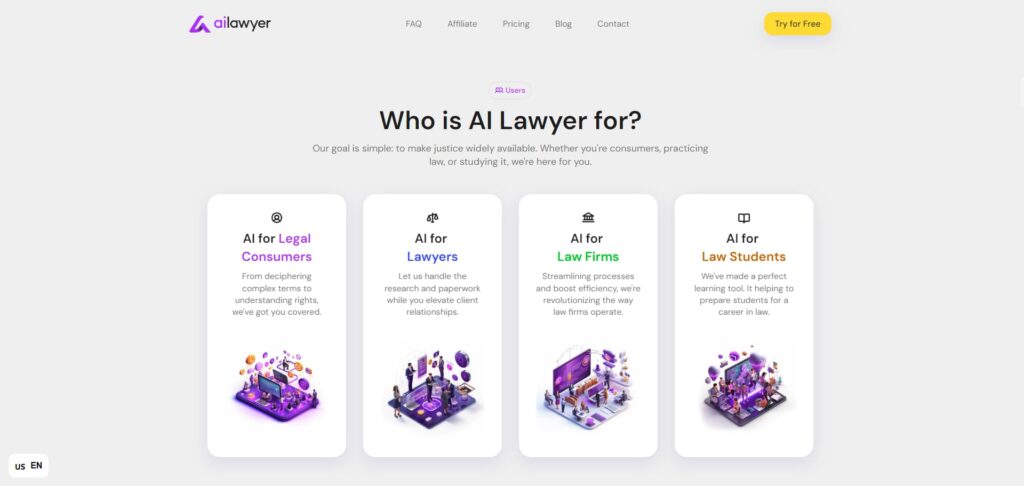In the evolving landscape of legal practice, one question consistently arises: what is the best ai tool for writing legal documents? With the increasing integration of artificial intelligence into various industries, lawyers are now embracing these innovations to enhance their work efficiency and improve the quality of their documentation. Legal professionals are recognizing that AI writing assistants provide not only solutions but also a pathway to modernize traditional practices.
The incorporation of AI technology in legal writing represents a significant shift, moving towards more efficient workflows that allow lawyers to focus on strategic tasks rather than mundane documentation. This article explores the transformative potential of AI writing assistants, examining their features, benefits, challenges, and recommendations for practitioners who wish to elevate their legal services.
The Evolution of AI in Legal Writing

The journey of AI in the legal field has matured over the years, leading us to the sophisticated AI writing assistants available today. As we delve into this evolution, it’s essential to understand how and why these technologies have become pivotal in shaping contemporary legal practices.
Historical Context of AI in Law
Historically, the legal profession relied heavily on manual processes for drafting, reviewing, and managing documents. The tedious nature of these tasks often left lawyers with insufficient time for critical analysis and client engagement. However, the rise of technology—especially AI—has transformed the legal workspace dramatically.
By automating repetitive tasks such as document review and e-discovery, early AI applications provided a glimpse into the future of legal assistance. It was only through advances in natural language processing (NLP) and machine learning that AI began to demonstrate an ability to understand legal nuances and generate coherent legal text. This evolution laid the groundwork for the current functionality of AI writing assistants.
Modern AI Technologies Reshaping Legal Practice
Today, AI writing assistants represent a new paradigm in legal writing. These tools can automatically draft contracts, prepare pleadings, and even summarize intricate legal arguments. By analyzing vast datasets, they enable lawyers to make informed decisions faster than ever before.
AI writing assistants amplify existing capabilities, allowing lawyers to harness the power of predictive analytics and streamline communication with clients. As a result, legal practitioners are empowered to take on complex cases with confidence, knowing they have AI-enhanced tools at their disposal.
Adoption Trends Among Legal Professionals
As the advantages of AI writing assistants become increasingly apparent, many law firms—large and small—are adopting these technologies. Factors driving this adoption include the need to increase efficiency, reduce errors, and ultimately deliver better service to clients. In recent years, we’ve witnessed a growing recognition among legal professionals that integrating AI into their workflow is not just an option; it’s becoming essential for remaining competitive in the market.
Moreover, AI tools foster collaboration within law firms, allowing teams to share insights and facilitate knowledge transfer. This collaborative environment not only enhances productivity but also cultivates a culture of innovation within the organization.
Key Features of AI Writing Assistants

The most effective AI writing assistants are equipped with an array of features tailored specifically to meet the demands of legal practitioners. Understanding these features is crucial for selecting the right tool for your practice.
Contract Generation and Drafting Capabilities
One of the standout functions of AI writing assistants is their ability to generate legal contracts efficiently. When tasked with drafting standard agreements like non-disclosure agreements or employment contracts, these tools can significantly reduce the time spent on manual drafting.
The contract generation process typically involves user input regarding specific terms and conditions, allowing the AI to create a comprehensive document that aligns with the user’s requirements. By removing the burden of repetitive drafting tasks, lawyers can devote more time to understanding their clients’ needs and formulating strategies that promote client success.
Furthermore, AI tools can analyze existing contracts to identify commonly used clauses, providing users with templates that reflect industry standards. This feature not only speeds up the drafting process but also ensures compliance with legal requirements.
Pleading and Motion Drafting Assistance
Another invaluable aspect of AI writing assistants is their ability to aid in the preparation of court documents, including pleadings and motions. These tools can offer templates for various types of legal filings, making it easier for lawyers to produce accurate and well-structured documents.
By suggesting relevant legal language and predicting arguments based on specific legal issues, AI writing assistants enhance the quality of submissions while decreasing the likelihood of errors or omissions. This level of support can be particularly beneficial for young attorneys or those practicing in highly specialized areas of law where precise language is critical.
Moreover, AI-driven insights can assist lawyers in anticipating opposing counsel’s arguments, enabling them to build stronger cases and articulate effective counterarguments.
Research and Summarization Features
Legal research is often one of the most time-consuming aspects of a lawyer’s job. Fortunately, AI writing assistants possess powerful research capabilities that allow them to quickly sift through vast databases of case laws, statutes, and articles to extract pertinent information.
These AI tools can summarize lengthy legal texts, highlighting key points and providing insights into relevant trends and precedents. As a result, lawyers can access valuable information much more rapidly, facilitating better decision-making and enhancing overall productivity.
Additionally, AI-assisted research tools empower lawyers to stay abreast of important legal developments, further improving their ability to serve clients effectively.
Top AI Writing Assistants for Lawyers

With a plethora of AI writing assistants available, selecting the right tool for your legal practice can feel daunting. Below, we explore some of the top contenders in the market, highlighting their unique features and the benefits they bring to legal professionals.
Lex Machina: The Power of Predictive Analytics
Lex Machina stands out as a leading AI-powered legal analytics platform. By offering insights into litigation trends, judge behavior, and case outcomes, it equips lawyers with data-driven strategies to enhance their practice.
The tool provides predictive analytics, which allows lawyers to assess the likelihood of successful outcomes based on historical data from similar cases. This capability empowers attorneys to make informed decisions regarding case strategy and negotiation tactics.
Moreover, Lex Machina enables legal professionals to analyze opposing counsel’s patterns, helping them identify weaknesses and strengths in their opponents’ approaches. This comprehensive understanding of the litigation landscape ultimately positions lawyers for greater success.
ROSS Intelligence: Revolutionizing Legal Research
Powered by IBM Watson, ROSS Intelligence offers advanced natural language legal research capabilities. Through its user-friendly interface, lawyers can ask questions in plain English and receive accurate responses derived from extensive legal databases.
ROSS’s ability to conduct automatic document summarization and identify relevant legal precedents makes it a game-changer for legal practitioners. By streamlining the research process, ROSS Intelligence helps lawyers save significant time and reduces the heavy lifting associated with traditional research methods.
In addition, ROSS fosters a deeper understanding of complex legal concepts, enabling attorneys to better advocate for their clients. The ease of access to substantive legal knowledge enhances both the quality and efficiency of legal services.
Casetext: Comprehensive Legal Research and Analysis
Casetext combines legal research and document analysis into a single platform, making it a robust option for legal professionals. Its AI-driven features allow lawyers to quickly locate relevant case law and gain insights into legal trends.
The platform’s AI-generated case briefs and summaries can significantly speed up the research process, equipping lawyers with the information they need to build strong arguments. Furthermore, Casetext’s expansive legal database facilitates thorough analysis and improves understanding of nuanced legal issues.
By enhancing the document review process, Casetext ensures that lawyers can turn around client work faster and more accurately.
ContractPodAi: Streamlining Contract Management
ContractPodAi is a cloud-based contract management solution that employs AI to optimize the entire contract lifecycle—from creation and negotiation to management and analysis.
This platform’s contract authoring capabilities allow lawyers to generate contracts efficiently while maintaining a library of standard clauses for quick reference. Additionally, the automated workflows and redlining tools enhance collaboration among stakeholders, reducing turnaround times in contract negotiations.
ContractPodAi’s analytics features provide insights into contract performance, which helps lawyers ensure compliance and mitigate risk. By decreasing administrative burdens and increasing transparency, this tool supports legal professionals in achieving better outcomes for their clients.
LawGeex: Accelerating Contract Review Processes
LawGeex specializes in AI-driven contract review, rapidly analyzing legal documents to identify key clauses and flag potential risks. This tool provides lawyers with insights into compliance issues and assists in making informed decisions related to contract language.
The automated contract review process can significantly reduce the time spent on document examination, enabling lawyers to focus on higher-priority tasks. By presenting redlining and markup tools, LawGeex enhances collaboration between legal teams and clients during the negotiation phase.
Ultimately, LawGeex equips lawyers with the resources they need to provide timely and accurate contract reviews, improving efficiency and client satisfaction.
Ethical Considerations Surrounding AI in Legal Writing
While the benefits of AI writing assistants are substantial, ethical considerations must be addressed to ensure responsible use within the legal profession. Understanding these concerns is crucial for practitioners who wish to embrace AI technology while maintaining the integrity of their work.
Addressing Bias and Fairness
One of the foremost ethical concerns revolves around bias and fairness in AI models. Since AI systems learn from existing data, any biases present in that data can be perpetuated, potentially resulting in discriminatory outcomes.
In legal contexts, reliance on biased data may lead to unfair treatment of individuals based on race, gender, or socioeconomic status. It’s imperative for legal professionals to critically evaluate AI outputs and assess the data sources being utilized. By doing so, they can work to minimize bias and ensure that AI tools contribute to equitable legal practices.
Ensuring Accuracy and Reliability
Accuracy remains a paramount concern when using AI writing assistants. While these tools often produce high-quality outputs, they are still susceptible to errors. Relying solely on AI-generated content without rigorous human review could lead to inaccuracies that compromise the integrity of legal documents.
To maintain high standards of accuracy, lawyers should view AI writing assistants as complementary tools rather than replacements for their expertise. Implementing a system of checks and balances will help prevent costly mistakes and uphold the standards of the legal profession.
Promoting Transparency and Accountability
Transparency is vital in establishing trust in AI systems. Legal professionals must strive to understand how AI tools arrive at particular outputs, ensuring that decision-making processes are clear and accountable.
By fostering open conversations about the workings of AI writing assistants, the legal community can address concerns and reinforce public confidence in the use of technology. Engaging in ongoing dialogue surrounding AI ethics will encourage the development of responsible practices that prioritize the welfare of clients and society.
Navigating Job Displacement Concerns
The automation of legal tasks through AI raises concerns about job displacement within the legal workforce. Although AI writing assistants can alleviate some tasks, it is essential to recognize that they are designed to augment rather than replace human expertise.
To navigate potential job displacement, legal professionals must embrace reskilling and upskilling initiatives. By focusing on competencies that require human judgment, empathy, and creativity, lawyers can position themselves for continued relevance in an evolving landscape shaped by AI advancements.
The Future of AI Writing Assistants in Legal Practice
Looking ahead, the future of AI writing assistants in the legal field holds immense potential for further advancement and specialization. Several key trends are likely to shape the trajectory of AI technology in legal writing.
Advancements in Natural Language Understanding
As AI technologies continue to evolve, we can expect improvements in natural language understanding. Enhanced algorithms will empower AI writing assistants to interpret complex legal language more accurately, generating nuanced and contextually relevant documents.
These advancements will unlock new possibilities for legal practitioners, enabling them to navigate intricate legal issues with greater ease and efficiency. By leveraging AI’s enhanced capabilities, lawyers will be better positioned to serve clients effectively.
Improved Contextual Awareness in AI Tools
Future AI writing assistants will likely develop deeper contextual awareness, allowing them to understand the specific circumstances surrounding legal documents. This development will lead to more tailored outputs that align closely with the unique needs of each case.
By possessing contextual awareness, AI tools will not only enhance their drafting capabilities but also support lawyers in making informed decisions about strategy and argumentation. The ability to generate personalized insights will cultivate a more responsive and adaptive approach to legal practice.
Integration with Other Legal Technologies
The integration of AI writing assistants with other legal technologies will streamline workflows and bolster efficiency. As these tools become interlinked, lawyers will benefit from seamless communication and data sharing across platforms, enhancing collaboration within legal teams.
For instance, combining AI writing assistants with case management systems will streamline document generation and tracking, allowing lawyers to manage their caseloads more effectively. This holistic approach can lead to improved outcomes for clients while optimizing the overall practice management experience.
Rise of Specialized AI Solutions
As the legal landscape diversifies, we can expect the emergence of specialized AI writing assistants tailored to specific practice areas. These niche solutions will cater to unique requirements, enabling lawyers to access bespoke tools that enhance their effectiveness.
Whether focused on intellectual property, family law, or corporate law, these targeted AI tools will provide practitioners with insights that are directly relevant to their fields. Such specialization will deepen lawyers’ understanding and execution of specific legal matters, ultimately delivering superior client service.
Video
Conclusion
The rise of AI writing assistants is revolutionizing the legal profession, empowering lawyers to enhance their productivity, accuracy, and service delivery. By harnessing the capabilities of these tools, attorneys can streamline repetitive tasks, engage in more strategic thinking, and provide exceptional client experiences.
However, as the implementation of AI becomes more prevalent, it is essential for legal professionals to consider the ethical implications and responsibilities tied to their usage. Embracing transparency, addressing potential biases, and maintaining high standards of accuracy will be crucial for building trust and accountability in the AI-enhanced legal landscape.
As we look to the future, we are poised for continuous advancements in AI technology that will redefine how legal writing is approached. By adapting to these changes and leveraging innovative solutions, lawyers can position themselves for success in an increasingly competitive and dynamic environment. Ultimately, the exploration of what is the best ai tool for writing legal documents will guide practitioners toward making informed decisions that enhance their practices and serve their clients more effectively.


